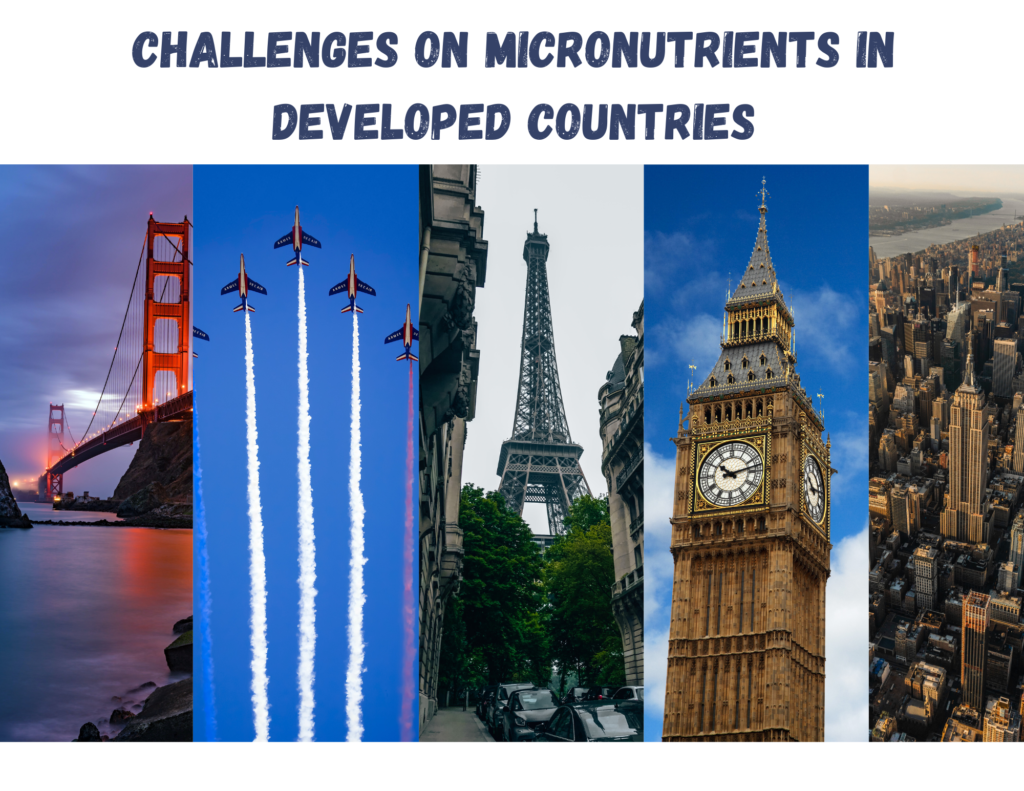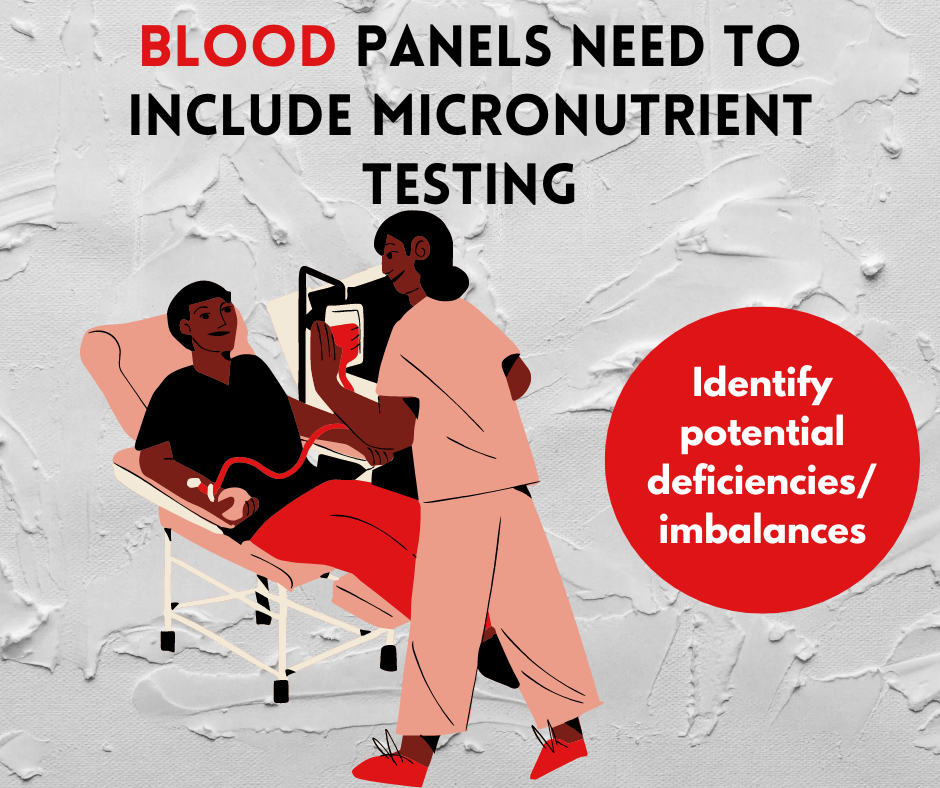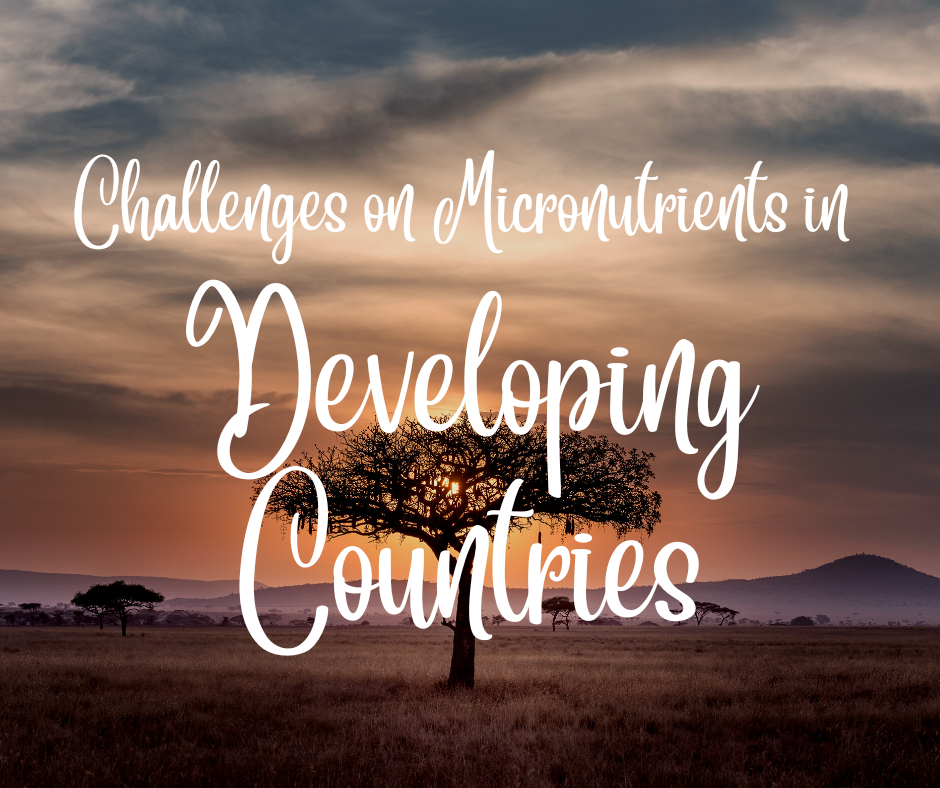Current Global Challenges on Micronutrients

Micronutrients are essential vitamins and minerals that our bodies require in small amounts to function properly. They play a crucial role in maintaining overall health, supporting growth, and preventing various diseases. While developed countries like North America and Europe have made significant progress in addressing nutritional deficiencies, challenges still persist. Moreover, in developing countries across Africa and Asia, micronutrient deficiencies remain a pressing concern. This page delves into the current challenges associated with micronutrients in these regions.
Navigating Micronutrient Challenges in Developed Nations
In developed nations, access to a wide range of foods may mitigate some micronutrient challenges. However, certain groups like the elderly, pregnant women, and individuals with dietary restrictions remain susceptible. Even with access, modern diets high in processed foods can lead to imbalances.

Vulnerabilities in Developed Nations
Developed nations often boast remarkable advancements in food production, distribution, and accessibility, contributing to a varied food landscape. While this abundance offers the potential to alleviate some micronutrient challenges, it’s crucial to recognize that not everyone within these societies equally benefits. Certain demographic groups, such as the elderly, pregnant women, and individuals with specific dietary restrictions, continue to be vulnerable to micronutrient deficiencies. Furthermore, the prevalence of modern diets, often characterized by the overconsumption of processed foods, introduces a distinct set of challenges that can result in nutritional imbalances and compromised health.


Vulnerable Groups: A Closer Examination
- Elderly Population: Within the developed world, the elderly face a unique set of nutritional challenges. Around the world, approximately 16% of adults aged 60 and above are undernourished. In developed countries like the United States, an estimated 3.7 million elderly individuals are at risk of malnutrition. Factors such as reduced appetite, impaired nutrient absorption, and limited mobility can contribute to inadequate nutrient intake.
- Pregnant Women and New Mothers: Developed nations are not exempt from maternal and child health concerns stemming from inadequate nutrition. In the United States, for instance, about 24% of pregnant women have inadequate intakes of iron. Moreover, the prevalence of gestational diabetes and excessive weight gain during pregnancy can be influenced by dietary factors.
- Dietary Restrictions and Preferences: Approximately 3% of Americans identify as vegetarians, and about 0.5% are vegans. These dietary choices, while aligned with ethical or environmental concerns, can lead to nutritional gaps without careful planning. A study conducted in Canada found that over 30% of vegetarians and vegans had inadequate vitamin B12 levels.
- Modern Diet Predicament: Processed Foods and Imbalances
Processed Foods and Micronutrient Density: The prevalence of processed foods in developed nations poses a paradoxical challenge. While these foods offer convenience and affordability, they are often energy-dense but nutrient-poor. The consumption of such foods can result in deficiencies of essential vitamins, minerals, and other bioactive compounds. In the United States, nearly 60% of the daily calories consumed come from ultra-processed foods. - Excess Sodium and Sugar: The love affair with processed foods contributes to excessive sodium and added sugar consumption. In the United States, the average daily sodium intake is estimated to be over 3,400 mg, far exceeding recommended levels. Similarly, added sugars constitute around 14% of total energy intake in the U.S., significantly higher than recommended limits.
- Imbalance of Macronutrients: Modern diets can be characterized by an overabundance of refined carbohydrates and unhealthy fats. In Europe, over 50% of adults are overweight or obese, with dietary factors playing a significant role.
Addressing the Challenges: A Call for Comprehensive Solutions


Inadequacies in Current Blood Panels: Overlooking Essential Micronutrients
Current blood panels, while providing valuable insights into various health markers, often fall short of encompassing essential micronutrients. These vital nutrients, such as vitamins, minerals, and trace elements, play a fundamental role in maintaining overall well-being and preventing a range of health complications. However, the omission of these micronutrient measurements in standard blood tests poses significant limitations on our understanding of individual health status and nutritional needs.
The importance of including essential micronutrient testing in routine blood panels cannot be overstated. Micronutrients are pivotal for a myriad of biological processes, including immune function, energy production, and cognitive health. Deficiencies in these nutrients have been linked to a plethora of health issues, ranging from anemia and bone disorders to impaired cognitive development and compromised immune responses. By incorporating comprehensive micronutrient analysis into regular blood panels, healthcare professionals gain a more comprehensive view of patient’s health and can identify potential deficiencies or imbalances early on.
The oversight of essential micronutrients in current blood panels also hinders personalized healthcare and preventive strategies. Each individual’s nutritional requirements are unique, and influenced by factors such as age, gender, lifestyle, and existing health conditions. Tailoring dietary recommendations and interventions without accurate micronutrient data can result in suboptimal outcomes. Moreover, as the world grapples with rising health challenges, including the increasing prevalence of chronic diseases, a holistic understanding of individual health has become paramount. Including essential micronutrient measurements in blood panels pave the way for a more proactive and individual-centered approach to healthcare, promoting better health outcomes and improved quality of life.

Addressing the Challenges: A Call for Comprehensive Solutions
Addressing these multifaceted challenges requires a combination of education, policy changes, and individual empowerment. Prioritizing nutrition education, supporting vulnerable groups, and advocating for nutritional reformulation of processed foods are steps toward a healthier, more balanced nutritional landscape. Developing dietary guidelines that emphasize whole foods, balanced macronutrients, and nutritional adequacy can serve as a compass for individuals navigating the complexities of modern diets.
Navigating Micronutrient Challenges in Developing Countries
Many developing nations grapple with severe micronutrient deficiencies. Vitamin A deficiency affects millions of children’s vision and immune systems. Iodine deficiency leads to cognitive impairments, while iron deficiency anemia affects both children and women, impacting cognitive development and work capacity.

Developing Nations: Micronutrient Battles in Asia and Africa
In the context of developing countries in Asia and Africa, the battle against micronutrient deficiencies takes on a particularly urgent and complex dimension. These regions are home to millions who grapple with severe nutrient shortfalls, leading to dire consequences for health, development, and overall quality of life. The challenges faced by these countries underscore the need for targeted interventions, policy reform, and global cooperation to alleviate the burden of micronutrient deficiencies.
Vitamin A Deficiency: Affecting Childhood Vision and Immunity
In many developing nations, vitamin A deficiency casts a long shadow over childhood health. This essential vitamin plays a critical role in maintaining vision, bolstering the immune system, and promoting normal growth. Regrettably, millions of children across Asia and Africa are affected by vitamin A deficiency. According to the World Health Organization (WHO), over 127 million preschool-age children in these regions are at risk of this deficiency. The consequences are dire: impaired vision, increased susceptibility to infections, and even an elevated risk of mortality in severe cases.Iodine Deficiency: Cognitive Impairments and Developmental Hurdles
Iodine deficiency remains a grave concern in many developing countries, particularly in Africa and parts of Asia. This micronutrient is essential for the production of thyroid hormones, which are pivotal for healthy brain development, particularly during pregnancy and early childhood. The absence of sufficient iodine can lead to cognitive impairments, cretinism, and stunted physical and mental development. It is estimated that around 1.88 billion people globally are at risk of iodine deficiency disorders. In regions like sub-Saharan Africa, where access to iodized salt is limited, the problem is particularly acute.Iron Deficiency Anemia: Impacting Children and Women
Iron deficiency anemia is a pervasive challenge in developing countries, disproportionately affecting children and women. Insufficient iron intake, often exacerbated by limited dietary diversity and poor access to healthcare, leads to reduced red blood cell production and oxygen-carrying capacity. The consequences extend beyond physical health, impacting cognitive development, work capacity, and overall productivity. In sub-Saharan Africa alone, it is estimated that 68% of pregnant women, 47% of non-pregnant women, and 40% of preschool-age children are affected by anemia.


Tackling Micronutrient Deficiencies: A Multi-Faceted Approach
Vulnerable Groups: A Closer Examination
Fortification Programs: Implementing fortification programs that add essential vitamins and minerals to staple foods can bridge gaps in nutrient intake. For example, fortifying salt with iodine has proven effective in addressing iodine deficiency.
Diverse Agricultural Practices: Promoting diverse and nutrient-rich agricultural practices can help increase the availability of a wider range of foods, improving dietary diversity.
Nutrition Education: Raising awareness about the importance of a balanced diet and the consequences of micronutrient deficiencies is crucial for encouraging healthier dietary choices.
Healthcare Access: Improving healthcare access, especially for pregnant women and children, ensures timely interventions and support to address and prevent deficiencies.


Global Collaboration for a Healthier Future
The challenges faced by developing countries in Asia and Africa in combating micronutrient deficiencies are immense. These challenges underscore the importance of global collaboration among governments, NGOs, and international organizations. By prioritizing nutritional well-being, these regions can work towards healthier populations, stronger economies, and a brighter future for generations to come.
Impact on Human Health
Micronutrient Deficiency Consequences:
The consequences of micronutrient deficiencies can be devastating. Impaired cognitive development, weakened immune systems, increased maternal and child mortality rates, and reduced work productivity are among the outcomes. The cycle of poverty and malnutrition continues as generations face reduced opportunities for growth and success.
Importance of Standard Micronutrient Testing Practices
Addressing Unknown Deficiencies:
A lack of standardized micronutrient testing practices hinders the accurate assessment of populations at risk. This blind spot can lead to insufficient interventions and policies, exacerbating the problem. Identifying deficiencies promptly is crucial for targeted interventions.Guiding Public Health Strategies:
Standardized testing allows public health officials to tailor interventions based on accurate data. Fortification programs, dietary guidelines, and supplementation efforts can be designed effectively, ensuring that the right nutrients reach the right people.
Conclusion
In developed nations, advancements in food production and distribution have created a diverse food landscape. However, not all segments of society benefit equally. Vulnerable groups like the elderly, pregnant women, and those with dietary restrictions still face micronutrient deficiencies. Modern diets, often rich in processed foods, further complicate the issue, leading to nutritional imbalances and compromised health.
The problem is even more acute in developing countries across Asia and Africa, where obtaining sufficient micronutrients from natural sources is a challenge. Micronutrient deficiencies deeply impact human health and hinder socioeconomic progress. Even in developed and developing nations, essential micronutrient testing is often lacking from standard medical check-ups, leaving individuals without vital health information.
This is where the MultiNutriMeter comes in. As a revolutionary solution, it establishes standardized micronutrient testing practices, bridging the gap between individual health and comprehensive information. By accurately identifying deficiencies and enabling targeted interventions, this technology promises to contribute to a healthier and more equitable global population. With the potential to transform healthcare by empowering individuals with essential health insights, the MultiNutriMeter stands as a beacon of progress for the future.
